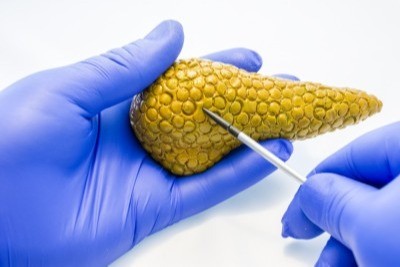Our Featured Research Page lists cancer prevention, treatment and quality of life studies enrolling people with or at high risk for hereditary cancers. Sign up for our community newsletter to stay up-to-date on the latest hereditary cancer research.
Search Results: Treatment + Pancreatic Cancer (16 results)

Treatment
Treatment study for people with advanced solid tumors
Study of a New InvestigationaI Inhibitor to Treat People with Advanced Solid Tumors
The study will test if an investigational treatment, XL309, is safe and works when used alone or in combination with a PARP inhibitor to treat people with some advanced solid tumors.

Treatment
Treatment study for people with advanced breast, ovarian or pancreatic cancer and an inherited or tumor BRCA mutation
Combining the Immunotherapy Dostarlimab and PARP Inhibitor Niraparib for Advanced or Metastatic Breast, Ovarian or Pancreatic Cancer with an Inherited or Tumor BRCA Mutation
This study is looking at the effectiveness of combining a PARP inhibitor called niraparib and an immunotherapy called dostarlimab for treating people with an inherited BRCA mutation (found with genetic testing) or a tumor mutation (found through tumor testing) who have breast, pancreatic, ovarian, fallopian tube or primary peritoneal cancer that is metastatic or advanced and cannot be removed by surgery (unresectable).

Treatment
Study of a new drug called ONM-501 for people with triple negative breast cancer, advanced solid tumors or lymphomas
Study of a New Treatment Called ONM-501 Alone and in Combination with Cemiplimab in People with Triple Negative Breast Cancer, Advanced Solid Tumors and Lymphomas
Study of a new drug called ONM-501 for people with triple negative breast cancer, advanced solid tumors or lymphomas

Treatment
Treatment study for people with advanced breast, ovarian, pancreatic or prostate cancer or gliomas
Study of the PARP inhibitor AZD9574 Alone and Combined with Other Cancer Medicines to Treat People with Advanced Solid Cancers (CERTIS1 Study)
This research involves studying a drug called AZD9574 on its own and in combination with other anti-cancer drugs in people with advanced cancer that has come back or progressed. AZD9574 is a type of targeted therapy known as a PARP inhibitor. The study aims to understand the safety, tolerance, how the drug moves in the body, how it affects the body, and its initial effectiveness.

Treatment
Treatment study for people with advanced cancers
Testing an Immunotherapy, Pembrolizumab, in Patients With Advanced Solid Tumors
This study is looking at the effectiveness of an immunotherapy, pembrolizumab, in treating people who have been diagnosed with advanced solid tumors that have progressed on standard-of-care therapy.

Treatment
Cancer treatment study for people with advanced solid tumors
TAPUR Study: Testing FDA Approved Drugs Targeting Tumor Biomarkers in People with Advanced Stage Cancer
The TAPUR Study aims to describe the safety and efficacy of Food and Drug Administration (FDA)-approved, targeted anticancer drugs prescribed for treatment of patients with advanced cancer that has a potentially actionable genomic alteration.

Treatment
Treatment study for people with advanced solid tumors
Treating Metastatic Solid Tumors with an Inherited or Acquired Gene Mutation Using the PARP Inhibitor Talazoparib
This study is looking whether the drug Talazoparib (also known as Talzenna) is safe and effective for treating people with advanced solid cancers (including breast, gastric, ovarian, pancreatic, prostate or other solid tumors) in people with an inherited mutation (found through genetic testing) or an acquired mutation (found with biomarker testing) in ATM, ATR, BRCA1, BRCA2, BRIP1, BAP1, BARD1, CDK12, CHEK1, CHEK2, IDH1, IDH2, MRE11A, NBN, PALB2, RAD50, RAD51, RAD51B, RAD51C, RAD51D, RAD54L or other genes.

Treatment
A Randomized Study of Olaparib or Placebo in Patients with Surgically Removed Pancreatic Cancer who have a BRCA1, BRCA2 or PALB2 Mutation (APOLLO)
The usual approach for patients with curable (i.e., non-metastatic) pancreatic cancer is a combination of surgery, FDA-approved chemotherapy, radiation (in select cases), then surveillance monitoring. This means that patients are typically monitored by their oncologist for evidence that the cancer has returned (recurrence), but they receive no additional treatment after the completion of surgery and chemotherapy.
The purpose of EA2192 / APOLLO is to compare the usual approach (observation) to treatment for one year with a drug called olaparib, in patients with BRCA1, BRCA2 or PALB2 mutation. EA2192 / APOLLO will help the study doctors find out if this different approach is better, the same, or worse than the usual approach. To decide if it is better, the study doctors will be looking to see if olaparib delays cancer recurrence compared to the usual approach of surveillance.

Treatment
Treatment study for people with advanced solid tumors, including triple-negative breast, ovarian, pancreatic and prostate cancer
NUV-868 Alone and in Combination With PARP Inhibitors in Patients With Advanced Solid Tumors
This study will test how safe and effective the experimental drug NUV-868 is by itself and in combination with a PARP inhibitor in people with advanced solid tumors. The first part of the study will include people with any solid tumor type, and the second part will include people with triple-negative breast, ovarian, pancreatic or prostate cancers only.

Treatment
Advanced pancreatic cancer or stage 4 breast cancer in people with a BRCA1 or BRCA2 mutation
SHARON: A Clinical Trial for Metastatic Cancer With an Inherited BRCA or PALB2 Mutation Using Chemotherapy and Patients’ Own Stem Cells
The purpose of this study is to see whether the combination of melphalan, BCNU, hydroxocobalamin, ascorbic acid, and autologous (self) bone marrow stem cell infusion, is safe and effective for treating patients with advanced pancreatic cancer or Stage IV, HER2-negative breast cancer who have a BRCA1, BRCA2 or PALB2 inherited mutation. All of these treatments are given intravenously (by vein). This study is open to people who have already received a PARP inhibitor, as well as those who have not. There are no restrictions on the number of prior treatments a patient has received before enrolling.

Treatment
Advanced ovarian, breast, prostate or pancreatic cancer
Investigational PARP Inhibitor AZD5305 Alone or Combined With Other Anti-cancer Agents in People With Advanced Solid Tumors (PETRA)
PETRA is studying a new PARP inhibitor AZD5305 taken either alone or combined with other treatments in people with advanced ovarian, breast, prostate or pancreatic cancer with an inherited or tumor mutation in: BRCA1/2, PALB2, RAD51C or RAD51D. The treaments participants receive will depend on their cancer type, mutation and when they join the study.

Treatment
Metastatic pancreatic cancer and a BRCA1 or BRCA2 mutation
Adding Pembrolizumab to Olaparib to Treat Pancreatic Cancer in People with an Inherited BRCA Mutation
This study is researching whether adding the immunotherapy drug Pembrolizumab (Keytruda) to the PARP inhibitor Olaparib (Lynparza) works better than olaparib alone in treating people with metastatic pancreatic cancer who also have an inherited BRCA1 or BRCA2 mutation.

Treatment
Advanced solid tumors
Treatment with ATR Inhibitor for Advanced or Metastatic Solid Tumors
This study will look at how well a new oral targeted therapy known as an ATR inhibitor works on advanced or metastatic solid tumors with mutations in genes linked to DNA damage repair. The study will look at response to treatment with the drug ART0380 in combination with the chemotherapy agent, gemcitabine.

Treatment
Solid tumors that are MSI-High and resistant to prior immunotherapy
Nivolumab and Relatlimab in Advanced Mismatch Repair Deficient (dMMR/MSI-High) Cancers Resistant to Prior PD-L1 Inhibitor
The purpose of this study is to evaluate the safety, effectiveness, and tolerability of using the immunotherapy drugs nivolumab and relatlimab in patients with microsatellite instability high (MSI-H) solid tumors resistant to prior PD-L1 therapy.
Both Nivolumab and Relatlimab are a type of immunotherapy known as immune checkpoint inhibitors. Immune checkpoint inhibitors are drugs that prevent cancer cells from switching off immune cells. This allows the immune system to find, unmask and destroy cancer cells.

Treatment
Pembrolizumab and Olaparib for People With Metastatic Pancreatic Cancer with Homologous Recombination Deficiency or Exceptional Response to Platinum Chemotherapy
This is a study for people diagnosed with metastatic pancreatic cancer with Homologous Recombination Deficiency, or whose disease has responded well to first-line or second-line platinum therapy. The goal of this study is to look at whether combining the immunotherapy drug, pembrolizumab and the PARP inhibitor, olaparib is a more effective treatment for this cancer than taking olaparib alone.

Treatment
A Randomized Study of an eHealth Delivery Alternative for Cancer Genetic Testing for Hereditary Predisposition in Metastatic Breast, Ovarian, Prostate and Pancreatic Cancer Patients
Genetic testing can be helpful to identify potential targeted treatments for some patients with metastatic cancer. But some patients have a hard time getting easy and fast testing. This study is looking at using web options to increase access to testing AND patients in this study can get genetic counseling and testing in their home! For more information visit the E-Reach registration page.


